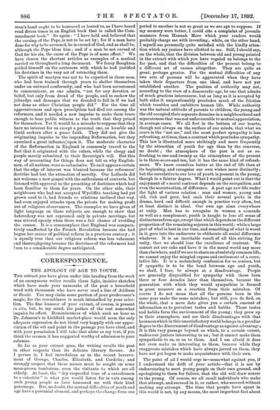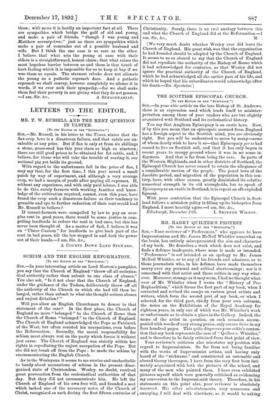CORRESPONDENCE.
TILE APOLOGY OF AGE TO YOUTH.
THE extract you have given under this heading from the work of an anonymous writer recalls those light, incisive sketches which have made your namesake of the past a household word with thousands who have never read a line of Addison or Steele. You may claim some portion of your predecessor's magic, for the resemblance is much intensified by your selec- tion. The fine humour of your extract, of course, is present in situ, but, to my mind, the pathos of the rest somewhat impairs its effect. Reminiscences of which such an hour as Dr. Johnson's in Lichfield market-place would seem the only adequate expression do not blend very happily with our appre- ciation of the wit and point in the passage you have cited, and with your permission I will take that alone as my text, if you think the sermon it has suggested worthy of admission to your columns.
So far as your extract goes, the writing recalls the past in other respects than its delicate literary flavour. As I peruse it, I feel incredulous as to the recent bereave- ment of George, Charles, Elizabeth, and Cordelia ; and strongly suspect that these names must be sought on some moss-grown tombstone, even the visitants to which are all elderly. At least, the " dry respectful tone of a catechumen to a catechist" is what you would listen for in vain among such young people as have honoured me with their kind patronage. Bnt, no doubt, the mutual difficulties of youth and age have a perennial element, and perhaps the change from one period to another is not so great as we are apt to suppose. If my memory were better, I could cite a complaint of juvenile manners from Hannah More which your readers would probably charge me with inventing ; while, on the other hand, I myself am personally quite satisfied with the kindly atten- tion which my juniors have allotted to me. Still, I should say,. on the whole, that the division between old and young painted in the extract with which you have regaled ns belongs to the far past, and that the difficulties of the present belong to• a different set of causes altogether. They are quite as- great, perhaps greater. For the mutual difficulties of any two sets of persons will be aggravated when they have• taken their departure from one ideal, and have not yet established another. The position of authority may not,. according to the view of a democratic age, be one that admits- of much gracious intercourse, but as long as it is accepted by both sides it unquestionably precludes much of the friction which troubles and embitters human life. While authority was the natural attitude of parents to children, the young and the old occupied their separate domains in a neighbourhood and separateness that was not unfavourable to mutual appreciation, in average cases. We all feel in the bottom of our hearts,. though not always on the surface of our minds, that what we crave is the "not me," and the most perfect sympathy is less refreshing, at times, than a contrast which precludes sympathy. This law is illustrated more strikingly and more frequently by the attraction of youth for age than by the converse,. no doubt ; the atmosphere of the past is not as re- freshing to one-and-twenty as the atmosphere of the present is to three-score-and-ten, but it has the same kind of refresh- ment. We know ourselves better at the end of life than at its beginning, and recognise our own wishes more distinctly ; but the correlative to our love of youth is present in the young,. though in a fainter degree. What I would point out is that the enjoyment of a moral contrast depends on the recognition, and even the accentuation, of difference. A past age saw life under the light of various relation : man and woman, young and old, rich and poor, had each their several parts in the drama, hard and difficult enough in practice very often, but at least distinct in ideal. Our own age aims everywhere at unity. Man has to recognise in woman a comrade as well as a complement, youth is taught to lose all sense of distinctness from age, except that which depends on the different proportion of the remaining sojourn in this world; while a large part of what is best in our time, and something of what is worst in it, goes into the endeavour to obliterate all social difference whatever. It is an inevitable result of all this striving for unity, that we should lose the excellence of contrast. We cannot eat our cake and have it in the moral world any more than elsewhere, and if we are to share an absolutely common life,. we cannot enjoy the mingled repose and excitement of a corre- lative life. It is a melancholy confession for us seniors, but if sympathy is to be the bond between age and youth,. we shall, I fear, be always at a disadvantage. People are generally disqualified for sympathy with those born three or four decades later than themselves, because the generation with which they would sympathise is formed in great measure on a reaction from their mistakes. Of course I do not mean that all the persons born in the same year make the same mistakes ; but still, you do find, on the whole, that a mere date gives you a certain amount of information as to prevalent tastes and habits. These tastes and habits form the environment of the young ; they grow up in their atmosphere, and see their disadvantages with that keenness which in this unsatisfactory world belongs in a peculiar degree to the discernment of disadvantage as against advantagr. It is this very passage beyond us which, to a certain extent, makes our juniors interesting to us ; but it cannot make them sympathetic to us, or us to them. And I am afraid it does not even make us interesting to them, because while they exaggerate mistakes which have always jarred on them, they have not yet begun to make acquaintance with their own.
The point of all I would urge is—somewhat against you, if' I understand the drift of your article—that it is not by endeavouring to meet young people on their own ground, and apologising to them for failure, that the old will draw nearer to the young. Of course, we all recall individuals who make that attempt, and succeed in it, or rather, who succeed without making any attempt. The time that people have spent in this world is not, by any means, the most important fact about
them; with some it is hardly an important fact at all. There are sympathies which bridge the gulf of old and young, and make a pair of friends, " though I was young and Matthew seventy-two;" just as there are sympathies which make a pair of comrades out of a possible husband and wife. But I think the one case is as rare as the other. I believe that what sets the young at ease with their elders is a straightforward, honest claim; that what raises the most hopeless barrier between us and them is that touch of hurt feeling which it is impossible for us to keep at bay if we woo them as equals. The sternest rebuke does not alienate the young as a pathetic reproach does. And a pathetic reproach we shall convey, however completely we silence it in words, if we ever seek their sympathy,—for we shall make them feel their poverty in not giving what they do not possess.







































 Previous page
Previous page